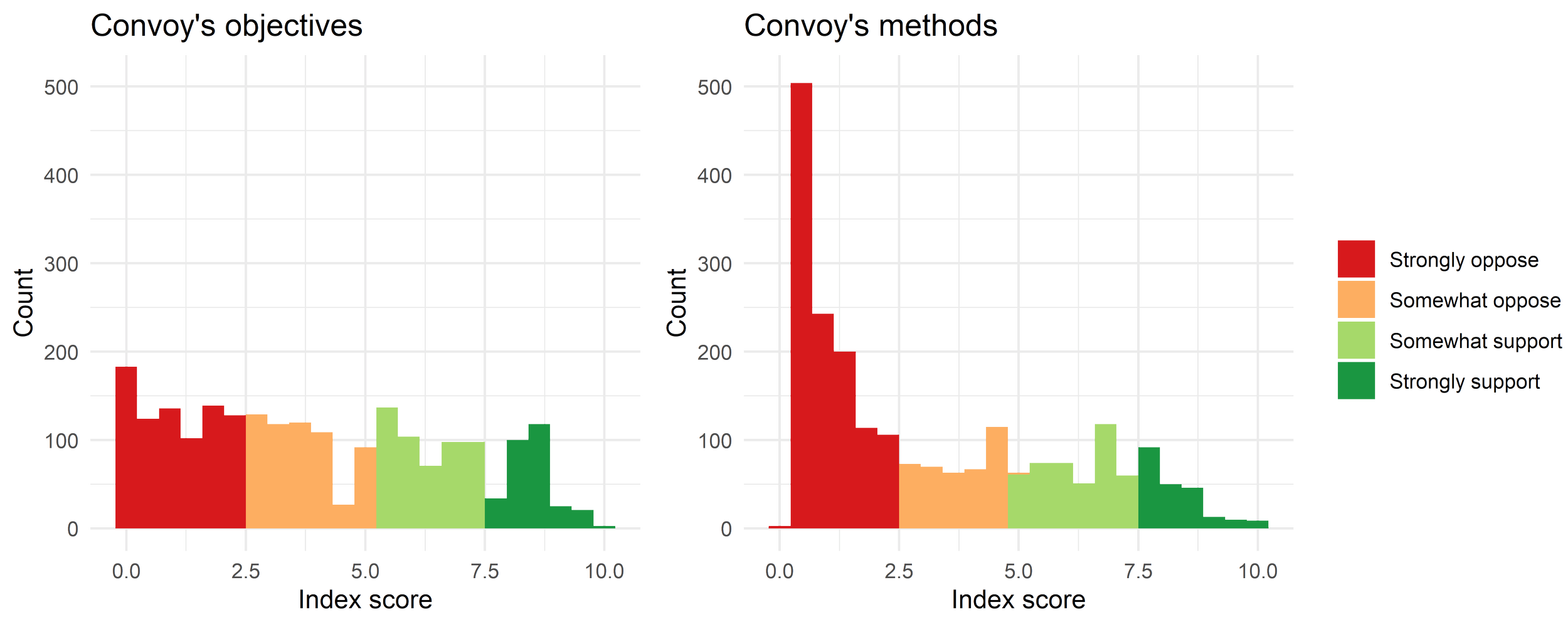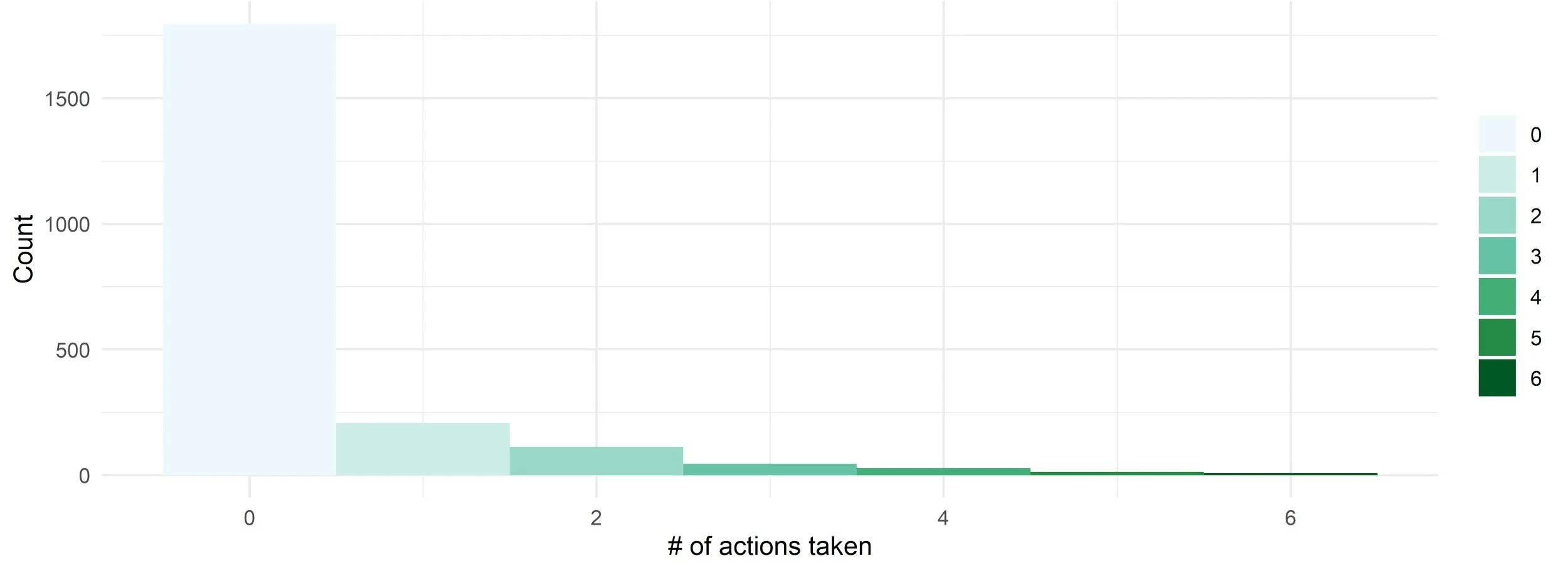Albertans’ Support for the Freedom Convoy
Noelle Jaipaul | University of Alberta | ljaipaul@ualberta.ca
Andrew Zhao | Pollara Strategic Insights | andrewzhao@pollara.com
Nikita Sleptcov | University of Alberta | sleptcov@ualberta.ca
Feo Snagovsky | University of Alberta | feodor.snagovsky@ualberta.ca
Jared Wesley | University of Alberta | jwesley@ualberta.ca
August 29, 2022
Introduction
On January 22, 2022, hundreds of Canadians set out in their vehicles from meeting points across the country to converge on Parliament Hill in Ottawa, Ontario. The instigating factor behind this ‘Freedom Convoy’ was opposition to a public health mandate that required truck drivers moving through United States’ and Canadian border crossings to be vaccinated against COVID-19. In 2021, an exemption was put in place by governments in both Canada and the United States that allowed for cross-border truckers to be unvaccinated against COVID-19, as they were deemed essential workers. Once the exemption expired on January 15, 2022 in Canada and January 22, 2022 in the US, truck drivers were once again required to be vaccinated in order to cross the border.
While the protests began in response to the vaccination requirements for these cross-border truckers, they morphed into a vocalization of broader frustration with pandemic-related public health measures, restrictions, and mandates. Some of these protests continued throughout the summer, even after most COVID-19 restrictions had been lifted across the country.
In this research brief, we look at Albertans’ support for the Freedom Convoy’s goals, the methods they used to bring them about, as well as how many Albertans themselves became involved or took action. Overall, the results of our survey show that the majority of Albertans do not support the objectives or the methods of the convoy, and the vast majority of Albertans did not take any action in response to the Freedom Convoy.
How Strong is Support for the Convoy?
While the Freedom Convoy began in response to the removal of the vaccination exemption for truckers, the goals of the convoy were wide-ranging and the organizers and participants were not a homogenous group. Most convoy participants demanded a repeal of COVID-19 vaccine mandates, mask mandates, and other public health restrictions. However, some organizers stated that the convoy was more broadly about protecting the rights and freedoms of Canadians against government overreach, while other organizers have been linked to far-right or extremist groups and COVID-19 conspiracy theory groups.
Our survey asked Albertans how they felt about the Freedom Convoy. We asked respondents whether they sympathized with the protesters and their views, whether they felt the protests were a fundamental attack on our system of democracy, whether they agreed with what the protesters were fighting for, whether the protesters were ultimately right, and whether the protesters were good people or patriots. We combined the results of these questions into a single index, corresponding to Albertans’ overall support for the Convoy’s objectives. Our survey also asked whether Albertans thought the protest was done the right way, whether protesters went too far in occupying Ottawa and blockading border crossings, whether the protests made Canadians’ lives better or worse, and whether politicians and the media over-reacted. We then combined the answers to these questions into a second index, corresponding to support for the Convoy’s methods.
Support for the Freedom Convoy’s Objectives
As Figure 1 shows, four in ten Albertans (39%) support the objectives of the Freedom Convoy, while six in ten Albertans (61%) oppose them.
Figure 1: Albertans’ Level of Support for Convoy Methods and Objectives
Source: Viewpoint Alberta Survey 2022 (n= 2224). Weighted data.
There is also a clear divide along partisan lines. Survey respondents who support the United Conservative Party (UCP) are more likely to support the objectives of the convoy (56%), while only 14% of New Democrat respondents support the convoy.
In rural areas, there was slightly more support for the objectives of the convoy compared to urban areas. 70% of survey respondents in Edmonton oppose the convoy’s objectives. However, in Red Deer, 53% of respondents support the convoy’s objectives, as well as 53% support in areas outside of the Calgary-Edmonton corridor. This aligns with a trend where rural communities feel disenfranchised or left out from government decision-making, and helps explain why support for the Freedom Convoy was higher in non-urban areas.
Older Albertans, those aged 65 and older, are more likely to oppose the convoy’s objectives (70%) than those under 65 (59%). At first glance, this may be surprising, as older Albertans tend to skew more conservative, and thus may be more likely to support the objectives of the convoy. However, the support from those under 65 may be a result of younger people being more affected by the closures of educational institutions, the shuttering of the hospitality industry that tends to employ more young people, and the inability to engage in leisure and recreation activities with friends. Additionally, people over the age of 65 are at higher risk of having more severe disease outcomes from COVID-19, which may also contribute to their support for COVID-19 public health measures and opposition to the objectives of the Freedom Convoy.
Support for the Freedom Convoy’s Methods
The Freedom Convoy protests saw approximately 500 vehicles and thousands of people blockading downtown Ottawa for several days, leading to disruptions in traffic, closures of local businesses, and residents feeling unsafe. While some protesters tried to promote a positive and peaceful atmosphere, even setting up hot tubs and bouncy castles, there were also reports of protestors harassing local residents, defacing public monuments, and displaying hateful symbols such as swastikas. Outside of Ottawa, participants blocked border crossings between Canada and the United States, contributing to supply chain disruptions.
Survey respondents were asked if they support the methods used by the Freedom Convoy. Only one-third (33%) of respondents support the methods of the convoy, while 67% oppose. In line with New Democrats opposing the objectives of the convoy, 93% of NDP respondents oppose the methods used by the convoy. In contrast, UCP voters are split down the middle, with 52% opposing the methods of the convoy, and 48% in support.
Again, an urban-rural divide emerged. Over three-quarters (76%) of Edmontonians oppose the methods used by the convoy, while outside of the Calgary-Edmonton corridor, 55% oppose and 45% are in support of the methods employed.
Taking Action and Speaking Out
The Freedom Convoy aimed to gain support from citizens across the country by encouraging people to join a local or national convoy protest, seeking donations, and promoting symbols leveraged by the Convoy, most notably, Canadian flags. Our survey asked if Albertans had taken any action in support or opposition of the convoy, including making a donation, flying a Canadian flag, or participating in a protest or rally. Breaking this down further by action, only 2% of Albertans reported that they had made a donation in support of the protest, 4% flew a Canadian flag, and 4% participated in a rally.
Figure 2: Actions Taken Related to the Convoy Amongst Albertans
Source: Viewpoint Alberta Survey 2022 (n= 2224). Weighted data.
Albertans also engaged with the Freedom Convoy by way of voicing their support or opposition for the protest. Over half (52%) of respondents said that they spoke out on behalf of, or against, the Freedom Convoy to people they knew, government officials, or on social media.
Supporters were a vocal minority, with 20% of Albertans speaking out in support of the Convoy. This represents a large share of the 31% of respondents who were either strongly in support of, or somewhat in support of the protest.
In contrast, 63% of Albertans strongly oppose or somewhat oppose the Freedom Convoy. However, only 34% of respondents spoke out against it on social media, to people they knew, or to government officials.
Was the Convoy a Success?
It is difficult to evaluate whether a social movement like the Freedom Convoy was ultimately successful. On the one hand, most COVID-19 restrictions were dropped shortly after the protests started. However, many observers would say that those restrictions were already on their way out, and that the timing of the two (start of the protests and end of the restrictions) was more coincidence than anything else.
One way to understand whether the protests were successful is by asking ordinary people what they thought. In this respect, just under one-quarter (23%) of Albertans feel that the Freedom Convoy was a success, while more than half (58%) stated that the protests were a failure. 19% thought that it was neither success nor failure. This indicates that the overwhelming majority of Albertans did not think the protests were successful.
Methodology of the Viewpoint Alberta Survey
The Viewpoint Alberta Survey was conducted between April 8 and May 9, 2022. The survey was deployed online by Pollara. A copy of the survey questions can be found here: https://bit.ly/3LelxQi. Pollara co-ordinates the survey with an online panel system that targets registered panelists that meet the demographic criteria for the survey. Survey data is based on 2,224 responses with a 15-minute average completion time. Split samples were employed for certain survey questions. The Viewpoint Alberta Survey was led by co-principal investigators Michelle Maroto, Feodor Snagovsky, Jared Wesley, and Lisa Young. It was funded in part by a grant from the Kule Institute for Advanced Study (KIAS) at the University of Alberta.


